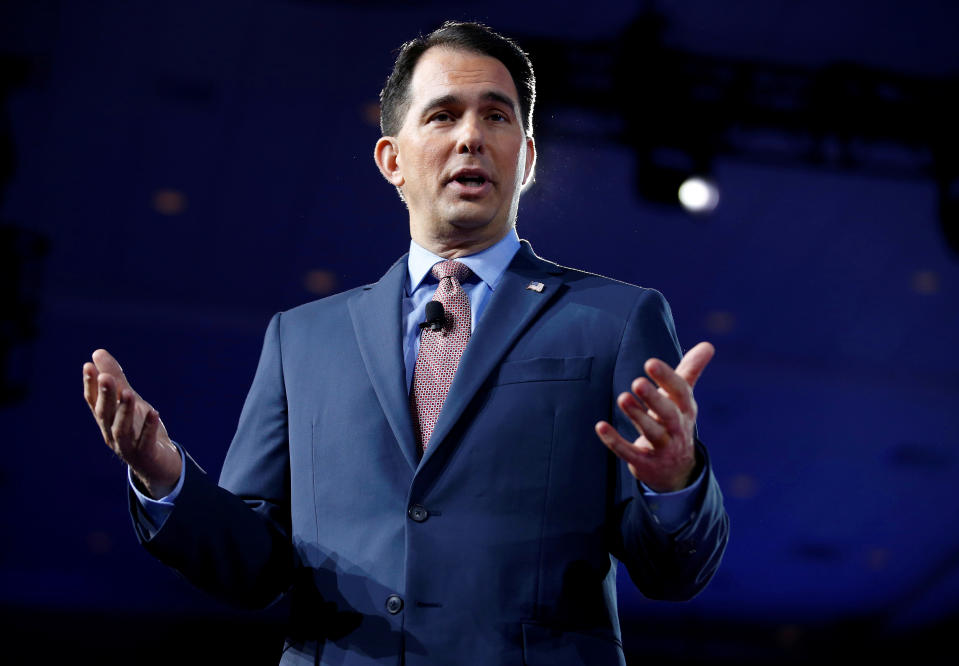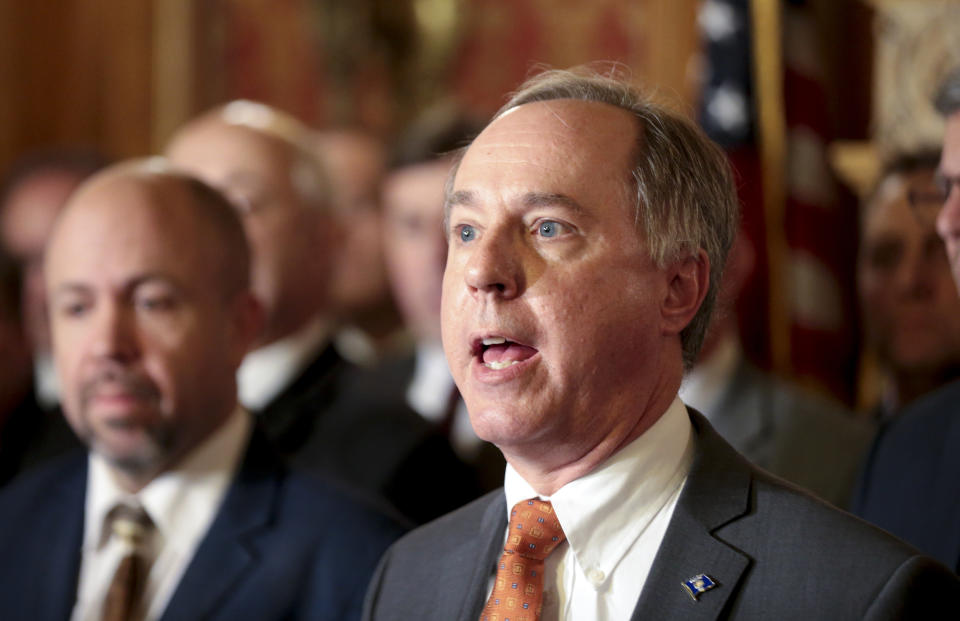Walker signs measures critics call a Republican power grab
Outgoing Wisconsin Gov. Scott Walker signed a package of bills Friday that would enhance the power of the Republican-controlled Legislature at the expense of the newly elected Democratic governor and attorney general.
Many critics have described these measures, along with similar ones pending in Michigan, as an unprecedented power grab that undermines the will of the people. And they have, with some justification, seen them as an outgrowth of the highly partisan, zero-sum politics practiced by the national Republican Party under President Trump.
But they do have precedents, albeit less egregious ones, under Democratic administrations. History shows that these are the types of actions parties engage in when they have held power for sustained periods, often by large margins, when they are more susceptible to overconfidence and arrogance and to panicking when they lose power.

One analogous example might be the efforts by the Democratic-controlled Legislature in 2010 to approve union contracts with state workers — over the objections of then-incoming Governor Walker, efforts that were ultimately unsuccessful. Joe Zepecki, a Wisconsin Democratic consultant, said measures like those were “not the same at all” in terms of their breadth, compared to the list of things Wisconsin Republicans are doing now.
The Wisconsin GOP has held control of the governorship and both chambers of the Legislature — what’s known as a trifecta — for most of the last decade. The man driving the legislation in Wisconsin, Assembly Speaker Robin Vos, has held the position since 2013, and Republicans have controlled two-thirds of that chamber since 2011.
The Republicans “never once had to make any meaningful compromises with the Democrats,” said Charlie Sykes, a Wisconsin conservative who was a longtime talk radio host in the state. “That breeds the kind of insular arrogance on display.”
In fact, Republicans have controlled the Wisconsin Assembly for all but two of the last 23 years.
“They certainly have been drunk with power for the last eight years,” said Zepecki, the Democratic consultant.
But in the 2018 midterms, Democrats took back four statewide offices that Republicans had controlled since 2011: governor, lieutenant governor, attorney general and state treasurer. Republicans have now rushed to pass a raft of bills designed to strengthen their hand against those officials, now that Democrats are set to control them.

Under Walker, the Republican Legislature has tried to pass similar measures, which would have given the Legislature more power over state agencies. Walker vetoed them, saying they would “encroach” on his office’s powers.
In addition, Walker on Thursday acted unilaterally to extend $28 million to a manufacturing plant in the state to keep it from closing and eliminating 388 jobs. But the same powers Walker used to make this deal would not be available to his successor, Democrat Tony Evers, under the provisions passed by the Legislature.
When Wisconsin Democrats tried to act unilaterally in 2010 in a lame-duck session, they had held the governorship for eight years, and the attorney general and treasurer’s offices for half that. In addition, they were seeing their hold on power in the Legislature, which had been absolute for two decades, from the early 1970s to the mid-’90s, slip away.
The national stakes for party power in Wisconsin are high. Wisconsin was a major battleground state in the 2016 presidential election and will be again in 2020. Trump defeated Democrat Hillary Clinton in 2016, by 23,000 votes out of 2.7 million cast, but the 2018 midterms indicate that the state is moving away from Trump.
Michigan is experiencing a similar shift. For eight years, Republicans have held a trifecta — the governorship and full Legislature — in addition to the two other major statewide offices: secretary of state and attorney general. In the midterm elections this year, however, Democrats took back the governorship, the office of secretary of state and the attorney general’s office.
The question now is whether the Republicans are simply doing what any party does when it’s about to lose power.
Conservative writer Noah Rothman has pointed to a handful of incidents in a few states that took place in the 1980s and 1990s, such as a series of moves by North Carolina Democrats to weaken incoming Republican Gov. James G. Martin in 1984 and 1988.

North Carolina was firmly in Democratic hands for most of the 20th century. That was true of most of the country, where Democrats controlled Congress and the majority of state legislatures from the New Deal in the 1930s, until their grip on power started to loosen in the 1980s and 1990s.
In the 1980s, Democrats held complete control of 23 state legislatures for the entire decade. And up until the 2010 election, Democrats still controlled 27 legislatures and 26 governorships, compared to 14 Republican legislatures and 24 Republican governorships. Democrats had 16 trifectas to nine for the GOP.
Republicans won the House in 1994 for the first time in 40 years, and had held it for all but the four years from 2006 to 2010 until Democrats won it back this fall. Republicans have controlled the U.S. Senate for 18 of the 26 years since the 1994 election. Democratic control of state legislatures lasted much longer, up through the 2010 election.
After 2010, the picture was dramatically different. Republicans controlled 25 legislatures and 29 governorships, compared to 16 Democratic legislatures and 20 Democratic governors. Republicans had 20 trifectas compared to 11 for Democrats.
Those margins expanded through the 2016 elections, but in the 2018 midterms, Democrats began to move things back their way.
The 2010 elections were crucial for Republican control of the redistricting process following that year’s census, and helped them cement their hold on power in Congress and in state legislatures. This is likely to be a key issue again in the 2020 elections, which will also be as much about the next census and redistricting process as it is about the presidency.
_____
Read more from Yahoo News:
Blackwater Beef anyone? Private security company’s founder now sells a different kind of muscle
Plea deal by Russian agent Maria Butina describes 2016 influence campaign
U.S. intelligence sounds the alarm on the quantum gap with China
Trump first wanted his attorney general pick William Barr for another job: Defense lawyer
Photos: French police kill suspect in Strasbourg Christmas market attack



